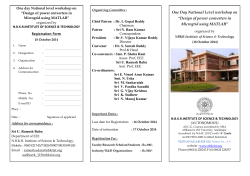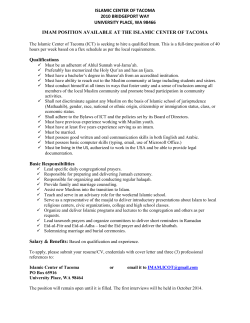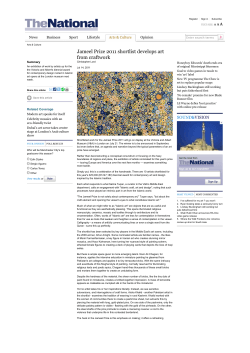
Registration Nomination
The participants will have to register for the short course in the morning on 24 November, 2014 at EEE Department, IUT. The registration fee is Tk. 5000 for local participants and US$ 200 for expatriate participants. Chief Patron Prof. Dr. M. Imtiaz Hossain, Vice Chancellor, IUT Resource Persons • Dr. Kazi Khairul Islam Professor Electrical and Electronic Engineering Department Islamic University of Technology (IUT) • Dr. Md. Ruhul Amin Professor Electrical and Electronic Engineering Department Islamic University of Technology (IUT) • Dr. Feroz Alam Khan Professor Physics Department Bangladesh University of Engineering and Technology (BUET) • Dr. Md. Anwarul Abedin Professor Electrical and Electronic Engineering Department Dhaka University of Engineering and Technology (DUET) • Dr. Farseem Mannan Mohammedy Associate Professor Electrical and Electronic Engineering Department Bangladesh University of Engineering and Technology (BUET) • Dr. Syed Iftekhar Ali Associate Professor Electrical and Electronic Engineering Department Islamic University of Technology (IUT) Course Officials • • • • • • • • • Dr. Md. Shahid Ullah, Professor and Head, EEE, IUT Dr. Kazi Khairul Islam, Professor, EEE, IUT Dr. Md. Ashraful Hoque, Professor, EEE, IUT Dr. Md. Ruhul Amin, Professor, EEE, IUT Dr. Mohammad Rakibul Islam, Professor, EEE, IUT Dr. ASM Shihavuddin, Assistant Professor, EEE, IUT Md. Monir Hossan Rubel, Lecturer, EEE, IUT Md. Ghulam Saber, Lecturer, EEE, IUT Minhaz Nur Alam, Lecturer, EEE, IUT Course Coordinator Dr. Syed Iftekhar Ali, Associate Professor, EEE, IUT Contact Address All inquiries concerning the short course should be addressed to Dr. Syed Iftekhar Ali, (Course Coordinator) Associate Professor, Electrical and Electronic Engineering Department Islamic University of Technology (IUT) Board Bazar, Gazipur-1704, Bangladesh. Office Phone: +880-2-9291254 – 59 (Ext. 3273) Mobile : +880-1816713591 Fax : +880-2-9291260 E-mail : s_ali@iut-dhaka.edu Organized by Department of Electrical and Electronic Engineering (EEE) The interested participants need to fill in the nomination form available at the IUT website at <http://iutoicdhaka.edu/shortcourse.php> and get it approved by the respective authority of the home institution. The approved nomination form must reach the course coordinator by November 20, 2014 via email or postal mail. http://eee.iutoic-dhaka.edu/ Registration Nomination Short Course on From Devices to Circuits and Systems: the Complete Design Methodology 24 – 27 November, 2014 Electrical and Electronic Engineering Department Islamic University of Technology (IUT) Organisation of Islamic Cooperation (OIC) Board Bazar, Gazipur-1704, Bangladesh www.iutoic-dhaka.edu Date The short course will be held on 24 – 27 (Monday-Thursday) November, 2014. Course Outline This short course is designed to give a sound knowledge in the design flow of Very Large Scale Integration (VLSI) of circuits which will be useful for introducing VLSI circuit design based courses of undergraduate and postgraduate levels in different universities of OIC member states. A tentative outline of the key topics of the course is given below: Starting at an introductory level, the course covers fundamental aspects of device structure, operation and modeling; fabrication techniques to realize nanometer scale devices; using basic devices such as field effect transistor (FET) to design basic gates, introduction to circuit simulation and layout design tools and using these tools to design more complex systems. Brief idea about high level synthesis using hardware description languages (HDL) and field programmable gate array (FPGA) will be given. Practical demonstration of some example designs will be shown to familiarize the participants with the use of different design tools. Numerous electronic gadgets such as mobile phones and laptops have become part and parcel of modern human life. From consumer’s point of view, there is an ever increasing demand for accommodating more functionality in smaller volume. From designer’s point of view, this implies miniaturization of electronic circuits. Miniaturization introduces newer challenges which must be dealt with for commercial realization of a product. On one hand, making of nanometer scale circuits is difficult due to physical limitations involved in the fabrication process steps. On the other hand, designing such small circuits requires proper modeling of the devices and sophisticated software and hardware tools. In developed countries, design and synthesis of integrated circuits (IC) have evolved into a highly advanced and challenging field. Unfortunately, in developing countries the universities often cannot afford the tools needed to teach this extremely advanced topic. No support from the industry is available either since generally there is no industry in this field due to the requirement of expensive investment and unavailability of expert manpower. Therefore, students graduating from the engineering/science field in these countries remain ignorant about this interesting topic. A common trend among meritorious students of these countries is to go to technologically advanced countries for postgraduate studies. These students are afraid of pursuing higher education in the VLSI circuit design field due to lack of basic knowledge. Hence, they cannot contribute in the field after coming back to their respective countries. The principal objective of the short course is to give the participants a basic knowledge about theories behind VLSI circuit design which will be useful for acquiring more in-depth knowledge on their own. In addition, introduction to different easily available tools will be given. Resource persons from different universities will deliver lectures. This will provide a platform for the participants to interact with them. In addition, all the lecture materials will be provided to the participants which will serve as a valuable reference after the short course. http://eee.iutoic-dhaka.edu/ Every year Islamic University of Technology (IUT) arranges intensive short courses to support the social and economic elevation of OIC member states. The aim of these short courses is to develop human resources in different branches of science, engineering and technical educations. Expert resource persons from renowned institutions of OIC member states as well as from different parts of the world share their valuable knowledge in the short courses. With the above aim, the Electrical and Electronic Engineering (EEE) Department of IUT is going to organize a short course in 2014. The title of the course is “From Devices to Circuits and Systems: the Complete Design Methodology”. Participants Course Objective The maximum number of participants is 40. The participants are requested to send their nominations through the member states or their organizations. They need to have at least Bachelors degree in the field of electrical/electronic/computer engineering or applied physics. The course is suitable for faculty members in technical universities/institutions who are thinking about introducing undergraduate/postgraduate courses and/or conducting postgraduate research in the VLSI field. Existing faculty members in the same field are also welcome. Medium of Instruction The medium of instruction will be English. Venue Organized by Department of Electrical and Electronic Engineering (EEE) Introduction The short course will be held in the premises of beautiful campus of Islamic University of Technology (IUT) at Board Bazar, Gazipur, Bangladesh, about 13km north from the international airport of Bangladesh. Additional information about IUT campus is available at the website <www.iutoic‐dhaka.edu>. Facilities IUT will provide hospitality to all participants including transport for the expatriates. The participants will be provided with furnished accommodation and food at IUT campus. All other expenses have to be borne by the participants themselves or their nominating authority. Travel grant (direct economy fare) may be available for expatriate participants from the least developing countries on request and subject to the availability of fund from Islamic Research and Training Institute (IRTI).
© Copyright 2025










